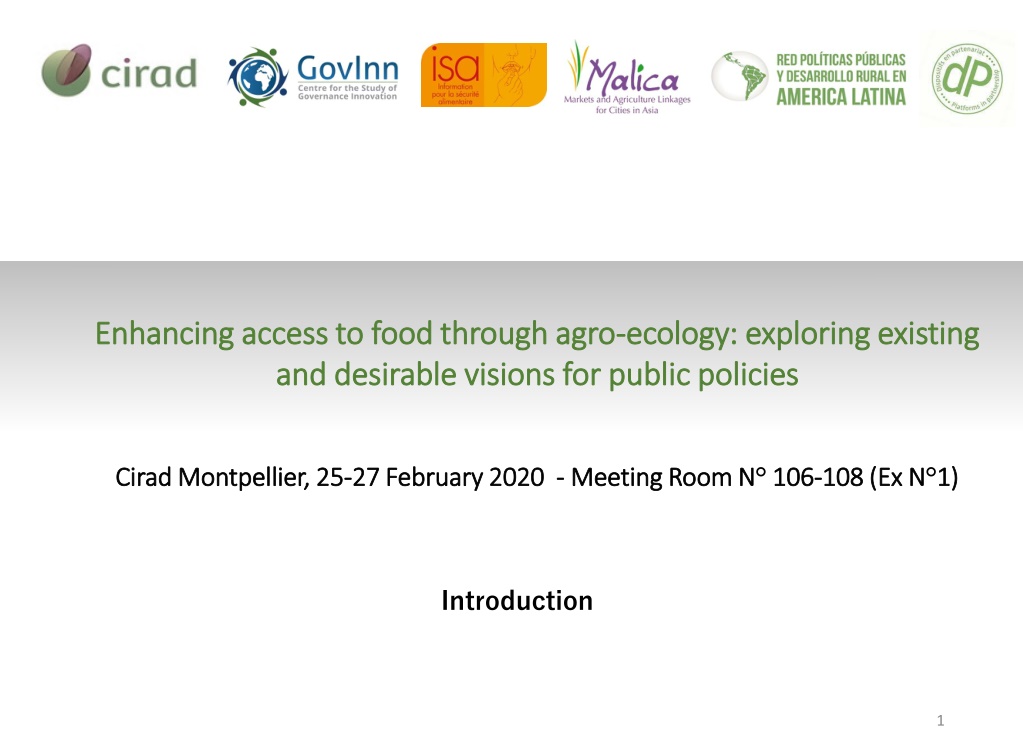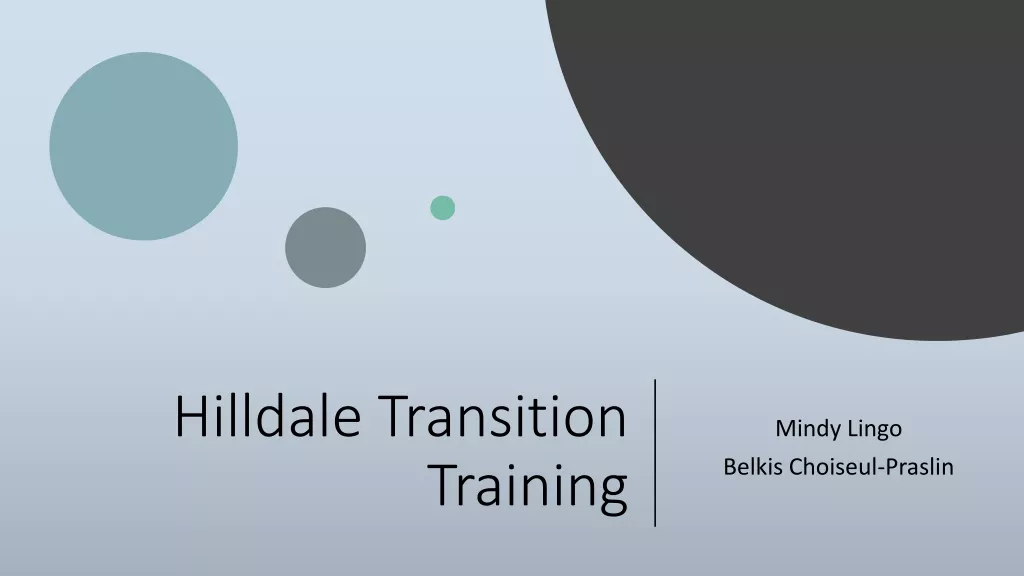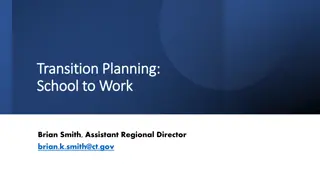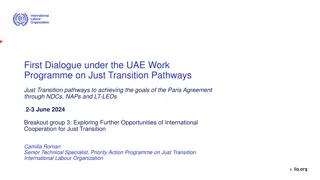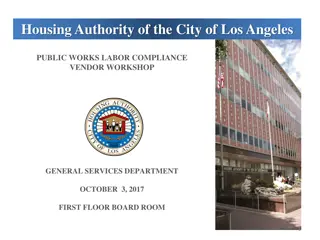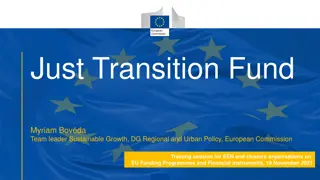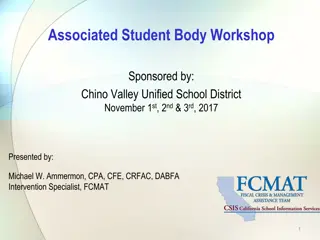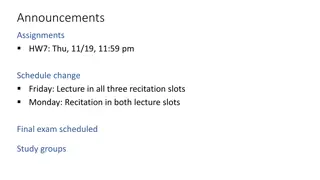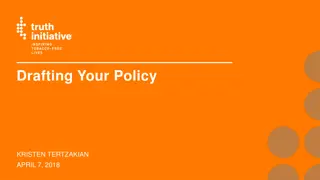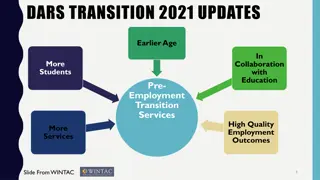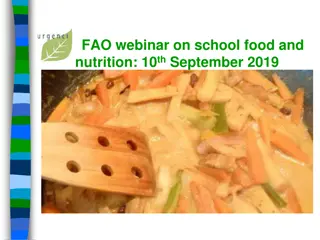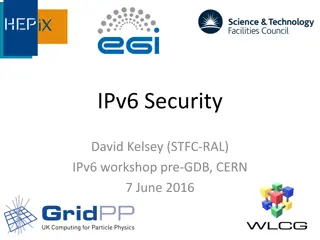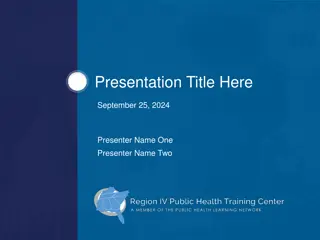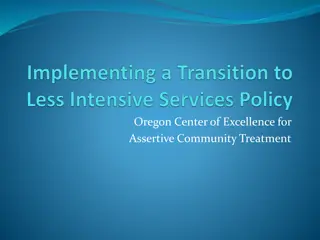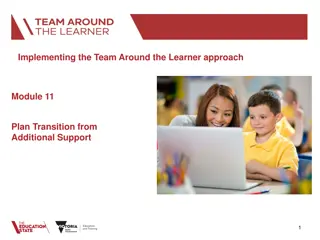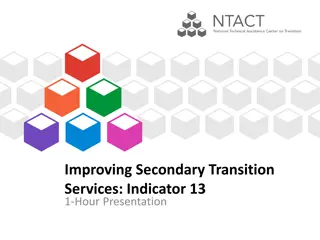Exploring Public Policies for Agroecological Transition Workshop
Workshop focused on harmonizing concepts, analyzing public initiatives supporting agroecology, exploring research methodologies, and developing fundraising strategies for agroecological projects. Participants collaborate to draft a research project document with the aim of enhancing access to food through agroecology.
Download Presentation

Please find below an Image/Link to download the presentation.
The content on the website is provided AS IS for your information and personal use only. It may not be sold, licensed, or shared on other websites without obtaining consent from the author. Download presentation by click this link. If you encounter any issues during the download, it is possible that the publisher has removed the file from their server.
E N D
Presentation Transcript
Enhancing access to food through agro Enhancing access to food through agro- -ecology: exploring existing and desirable visions for public policies and desirable visions for public policies ecology: exploring existing Meeting Room N 106 106- -108 (Ex N 108 (Ex N 1) 1) Cirad Cirad Montpellier, 25 Montpellier, 25- -27 February 2020 27 February 2020 - - Meeting Room N Introduction 1
Objective of the Workshop - Sharing knowledge, harmonizing vocabulary elements and concepts, and clarifying problematic points and concepts : agroecology, organic farming, Agroecological Transition, etc - Carrying out an initial inventory of existing public action initiatives that support the agroecological transition in the three regions and their effects based on literature and field experiences identified by the participants; - Studying the possibilities of applying a (non-exhaustive) set of research methodologies on the three main axes o comparative analysis of the socio-technical-economical performances of the productive and food systems; o analysis of public policy mechanisms that support the agroecological transition; o prospective analysis allowing the development of desirable visions of public policies for agroecological transition and their arguments. - analyzing the fundraising strategies to be followed (calls, funders, partnerships, traps to avoid, etc.) and the desired project formats in order to consider submitting a project submission in 2021; - writing a pre-project document including main work-packages, possible activities, case studies and fieldwork, methodological choices, team and site managers ; elaborating a redaction schedule and appointing team members that will be in charge of the next steps.
Methodological proposal for the workshop Three phases: 1- Tuesday 25/02: A presentation of the participants allowing to share knowledge and experiences on agroecological transition, research activities, to discuss the understanding of the project proposal, and to create a common language around the research questions and the main concepts to be used. 2. Wednesday 26/03 an Thursday morning : A discussion around existing research methodologies and their possible application to our research questions, around three main thematic axes 3. Thursday afternoon 27/02: Preparation of the research project, including a session on funding options and the corresponding formats, and a working-group session dedicated to the redaction of a first draft of the research project.
Diagram of the three thematic axes of discussion of the workshop Comparative study of production costs, labour and incomes of agri-food systems Analysis of incomes uses and effects on food security Performa nces of producti ve systems at local scale Agro- cological Transition policies Actors, coalitions, representations Policy mapping /tracing policy evaluation Prospective Desirable AET Scenario building construction of policy arguments
Expected outcome of the workshop - The main concepts used in the project proposal are clarified leading to a common understanding of these concepts; - The problem and the logic of the project proposal are discussed and revised if necessary, - An inventory of the possible sites (main challenges, public policy actions, etc.) and recent or current projects is carried out, - The broad outlines of the project (in terms of main topics, scale, field areas, activities, methodologies, etc.) are drawn for each thematic area of the project; - The available experiences and skills to be sought are identified; - A first list of funding opportunities is created; - A roadmap specifying the schedule and responsibilities is defined.
Socio Socio- -technical technical- -economic performances of existing productive systems economic performances of existing productive systems The objective is to characterise differentials in terms of production costs, employment and incomes related to transitions to agro-ecology through more sustainable food systems. qualify/quantify household s incomes to estimates of production costs, yields and value of organic, agro-ecological or conventional products The analyses of these differentials should emerge from the comparison of alternative sustainable food systems feeding the transition to agro-ecology, with more conventional models of food systems (which embody the dominant policy referential). The comparison encompasses either up-stream (procurement, conventional and agro- ecological inputs, labour requirements) and down-stream levels of food systems (market access, prices, certification models) Analyses focused on households and food systems should be a priority in order to capture both employment/incomes as well as food security and health (nutrition) dimensions as the most important effects of these alternatives and their visibility in the policy agenda.
Existing public policy arrangements their processes of design and limits The purpose is - to identify emerging coalitions of actors, to understand their motivations and the ideas and representations they support, - to analyse their effects on the production of innovative public policies supporting transitions to agroecology. - Scrutinise the drivers of social changes, at different scales and in different regions, is a requisite step to grasp divergence and convergences of public policies. The point is thus to examine a range of public policy instruments, to build typologies and to verify and compare their effects on, or their advantages for agro-ecological transitions that enhance income and food accesses. Those comparisons can be realised through appropriate methods, and in particular the IMPRESS one. The cartography of impactpaths of different categories of instruments in different regions would thus allow informing decision-making regarding agro-ecology transition (AET) for income and food access.
3. Prospective tools for developing desirable visions of AET policies and their arguments. The two stocktaking exercises need then to be integrated in critical consistent ways through a collective elaboration of desirable visions of public policies supporting AETs, mediating a prospective approach. the objective is to identify and to question the dominant and alternative visions of AET, to then elaborate and document representations of alternative policies (possible and desirable) to achieve AET. Among available methods one option is the co-elaboration of scenarios based on the identification of factors of change (technical economic or political in particular) of existing policy initiatives. This first method can be associated with the method of back-casting in order to identify key steps linking a selected preferred vision to the present situation. Hence, the consistent articulation of the two components in one or more vision(s) of AET allows for their integration and to achieve the construction of policy argumentation(s) according to the chosen vision.
25 /02/2020 9 :00 : participant quick presentation and introduction of objective and program of the workshop 26 /02/2020 9:00 Methods axe 1 27 /02/2020 9h00 : Methods axe 3 Program - E Penot : Olympe model, production costs & incomes - L Temple : How to estimate work - P Girard : labour & employment - C Lamine: Actors initiative at local scale. - M Patrouilleau, M De Lattre : scenarios tools in prospective 10 :00 Situation in each region/country/partners. Existing or recent actions and specificities according to the 5 question J May, M Soumar , H Kambir P Niederle, T A Dao/ M. Xiong, MM Patrouilleau, M Hanitra, T Raharison, etc - G Blundo : ImpresS ex Ante + application to FAIR project regarding interface with anticipation tools 11:30 Recent or existing actions: K. Naudin : constraints on the scale of cropping systems (FAIR) 12:00 Synthesis (visio connection) 13 :00 Lunch 14:00 Continuation S Dury : income use for family food system S Fr guin-Gresh/ E Bouquet : Food practices & strategies 12 :00 12 :00 Synthesis lunch 14h : method axe 2 - S Gu neau et C Grisa : policy agenda - JF Le Coq, E Sabourin: Policy mapping, policy mix - T Le Cotty : policy evaluation tools - E Hainzelin : ImpresS ex post Lunch 14h00 Debriefing Valo : options for project building and donors specificity 15 :00 Working group : preparation operational project elements 17 :00 Synthesis (visio connection) 17h Synthesis 17h D cisions & conclusions visio
